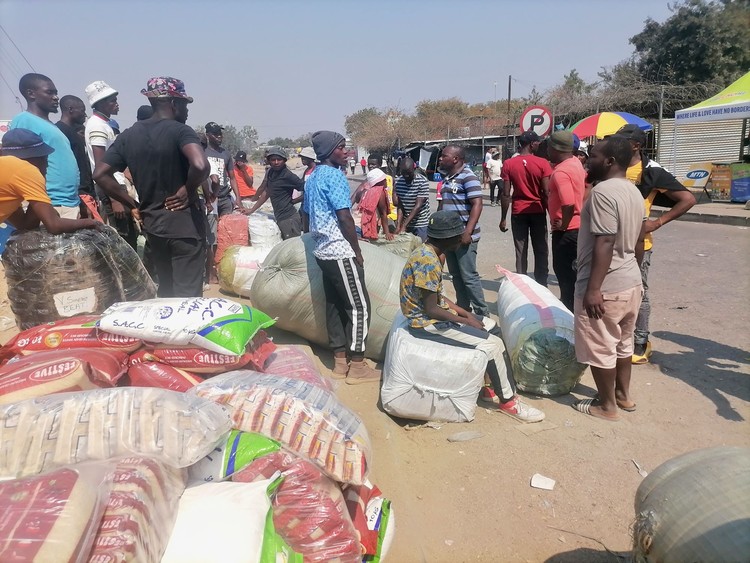Zimbabweans at Beitbridge border sceptical about elections
Waste of money travelling to Zimbabwe to cast vote, says one woman
Zimbabwean youths at Beitbridge border post, who call themselves “Zalawas”, carry loads for people shopping in South Africa and charge about R100 a trip across the border. They were sceptical about anything in Zimbabwe changing due to the elections. Photo: Bernard Chiguvare
As polls open for general elections in Zimbabwe to elect the country’s President and the legislature, GroundUp spoke to Zimbabwean youths at the Beitbridge border post. Most said they will not bother crossing the border to exercise their voting rights. They were sceptical about any political change arising from Wednesday’s elections.
“This is not the first time we have witnessed the current ruling party clinging to power even though they have been voted out,” said a 23-year-old from Midlands Province.
He said he expected a repeat of the 2018 elections, when ZANU-PF officially won 52% of the vote.
He was in South Africa because he could not find a job in Zimbabwe. He washes trucks at the Limpopo truck stop.
A woman from Harare expressed a similar view. “No matter how Zimbabweans vote against the ruling ZANU-PF, results will always come in favour of ZANU-PF. So there is no need to waste money travelling to Zimbabwe to cast my vote,” she told Groundup.
For the past five years she has been doing laundry for long-haul truck drivers.
“In 2018, I voted against ZANU-PF, thinking we were going to realise a change, but that never materialised,” said another young man. He sells second hand car tyres at the border. “Now I think the best way is to join this ruling party. Maybe the party will offer us jobs.”
On Wednesday morning, as the polls open, the usually busy Beitbridge border is quiet.
2023 Zimbabwean General Election
Next: Mystery surrounds black empowerment gains from G4S prison contract
Previous: Protest over poor service at Khayelitsha Home Affairs
© 2023 GroundUp. This article is licensed under a Creative Commons Attribution-NoDerivatives 4.0 International License.
You may republish this article, so long as you credit the authors and GroundUp, and do not change the text. Please include a link back to the original article.
We put an invisible pixel in the article so that we can count traffic to republishers. All analytics tools are solely on our servers. We do not give our logs to any third party. Logs are deleted after two weeks. We do not use any IP address identifying information except to count regional traffic. We are solely interested in counting hits, not tracking users. If you republish, please do not delete the invisible pixel.



